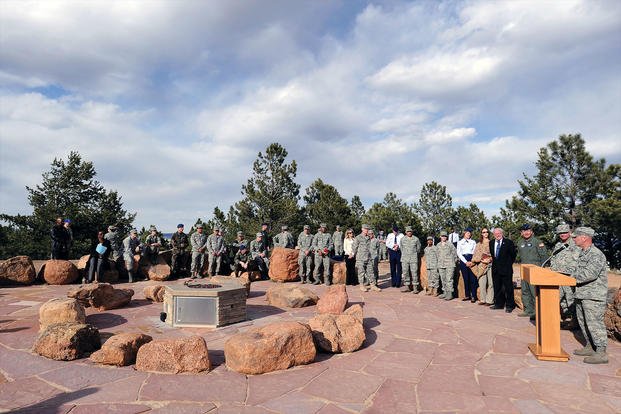For a country -- and military -- that espouses freedom of and from religion, one's choice of faith shouldn't matter. But often, it does.
"It's really hard to find community," said one Navy wife, Kerri-Leigh Grady, a practicing Wiccan. "It's really hard when -- let's be honest -- (the military community) is very Christian-centric. A non-denominational prayer is going to be a non-denominational Christian prayer."
Grady has two kids, a husband who has often deployed, and a string of places she's PCSed to and from over the years. She's a software engineer and a writer of horror and romance.
"I'm kinda boring," Grady says with a laugh.
Wicca is a branch of paganism that developed during the 1930s in England by Gerald Gardner, a civil servant who became interested in witchcraft and the occult. The core tenants of Wicca include the worship of a god and goddess (among other deities), a celebration of nature, and the practice of witchcraft.
The religion spread to America in the 1950s, growing rapidly during the counter-cultural movement of the 60s. Wiccans traditionally practice in a coven-- a small group of like-minded witches--although Grady says that many Wiccans, especially those in the military community, are solitary not by choice but by necessity.
Even though paganism has been around for millennia and Wicca is more than a half-century old, many are deeply suspicious of the practices. While Grady's never lived her religious life quietly, she has noticed that some Wiccans in the military community do, going so far as to live their Wiccan lives secretly. At one point, she attended a pinning ceremony for a Navy chief who was part of her coven; however, she was under strict instructions from the sailor to be vague and change the subject if she was asked how she knew him.
"It's hard to. . . be honest [as a Wiccan] about what your spiritual needs are. It's hard when you've got chaplains who think you're evil and just talking to you will send them to hell. It's hard finding community that Christians take for granted," Grady says.
In search of religious community in military life, Grady became a lay leader for Wiccans. "We were stationed in Bahrain," she says, a country that outlaws the practice of any non-Abrahamic faith unless given governmental permission. "I was curious about how to get together with other Wiccans."
The military sanctions credentialing programs for lay leaders, regardless of their faith tradition. A lay leader is "the one who interfaces with chaplains to get equal time at the chapel or other space on the base," according to Grady. They are also the designated leader of the group for meetings, funding requests and other interfacings between service members and the governmental structure of the military.
The certification process includes a lot of reading and writing. "Their focus was on making sure you had a very solid foundation on the basics of Wicca," Grady says. The program took the software engineer--who was working full-time--a year to complete. "As I was closing in on the end [of the program], I thought I was ready to at least go back with the information that I had. I knew we could get things rolling with the local chaplain's office."
But when Grady first entered the office and identified herself as a Wiccan looking to begin a group on base, the first chaplain she encountered refused to work with her. He stepped into an adjoining room, and without closing the door, said to another unseen person, "Could you take this one? I don't want to touch it; it's a Catholic thing." While she eventually did find a sympathetic chaplain to help her, when he left, his replacement was completely unresponsive to her requests.
From surprise to less-than-sterling responses, Grady has experienced it all when others discover she's a Wiccan military spouse. She acknowledges that most people are surprised, more than anything: "I guess I don't come off as being subversive and weird." But she wishes that others in the military community would be more sensitive to religions that aren't understood well. "It would be really nice if the conversation wouldn't go to 'Why do you worship Satan?' right away," Grady says.
The lay leader wants people from more majority faiths to remember the difficulties that those in the minority experience, too. "When you don't even have an organization that's approved by the military to create Wiccan clergy [chaplains], that means you don't get that resource," says Grady. "The rest is on yourself-- to be your own priest or priestess-- and that's an extra burden that military personnel don't need to have."
Keep Up with the Ins and Outs of Military Life
For the latest military news and tips on military family benefits and more, subscribe to Military.com and have the information you need delivered directly to your inbox.









